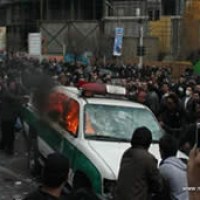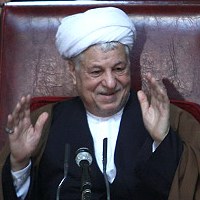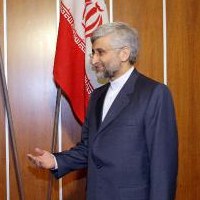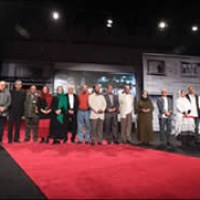![]()
WikiLeaks
Baku Iran Watcher met with a two Iranian NGO leaders who focus on children’s rights and drug addiction problems in poor areas on Tehran and other cities. Among other activities the NGO operates child-feeding programs that support approximately 4,000 families. The pair work in some of the poorest urban neighborhoods in Tehran, and have first-hand insights into recent social, economic, and political conditions in these urban areas.
The pre-eminent problems they cited included rising child malnutrition and drug addiction (both allegedly becoming more prevalent in urban vice rural areas); poor living conditions and lack of access to schooling for “many thousands” of Afghan refugee children, as w3ell as many poor Iranian children; and the existence of a de facto narco-culture in many poor urban areas, in which “warrens” of under- and above-ground drug laboratories amount to a cottage industry. In some urban areas, they claimed, hard drugs are both easier to get and cheaper than bread. While much of this information coincides with previously reported allegations and anecdotal evidence, this is the first time Iran watcher has had access to knoledgeable eyewitness testimony concerning these conditions.
Source: WikiLeaks
Reference Created Classification Origin 10BAKU63 2010-02-01 09:05 CONFIDENTIAL Embassy Baku
VZCZCXYZ0000
RR RUEHWEBDE RUEHKB #0063/01 0320905
ZNY CCCCC ZZH
R 010905Z FEB 10
FM AMEMBASSY BAKU
TO RUEHC/SECSTATE WASHDC 2316
INFO RUCNIRA/IRAN COLLECTIVE
RUEHIT/AMCONSUL ISTANBUL 0205
RUCNDT/USMISSION USUN NEW YORK 0356
RUEATRS/DEPT OF TREASURY WASHDC
RHMFISS/CDR USCENTCOM MACDILL AFB FL
RHMFISS/CDR USEUCOM VAIHINGEN GE
RUEAIIA/CIA WASHINGTON DC
RUEKDIA/DIA WASHDC
RUEKJCS/JOINT STAFF WASHDC
RHEHNSC/NSC WASHDC
RUEKJCS/SECDEF WASHDCC O N F I D E N T I A L BAKU 00063
SIPDIS
E.O. 12958: DECL: 01/29/2020
TGS: PHUM, SNAR, PGOV, ECON, UN, AF, AJ, IR
SUBJECT: IRAN: CHILD MALNUTRITION, DRUG USE, DRUG LABS
AFFLICT URBAN POORREF: A. A) 2009 BAKU 942
¶B. B) 2009 BAKU 478
¶C. C) 2009 BAKU 406
¶D. D) 2009 BAKU 178
¶E. AND PREVIOUSClassified By: Pol/Econ Counselor Rob Garverick, Reasons 1.4 (B and D)
Summary
——–¶1. (C) Baku Iran Watcher met with a two Iranian NGO leaders
who focus on children’s rights and drug addiction problems in
poor areas on Tehran and other cities. Among other
activities the NGO operates child-feeding programs that
support approximately 4,000 families. The pair work in some
of the poorest urban neighborhoods in Tehran, and have
first-hand insights into recent social, economic, and
political conditions in these urban areas.¶2. (C) The pre-eminent problems they cited included rising
child malnutrition and drug addiction (both allegedly
becoming more prevalent in urban vice rural areas); poor
living conditions and lack of access to schooling for “many
thousands” of Afghan refugee children, as w3ell as many poor
Iranian children; and the existence of a de facto
narco-culture in many poor urban areas, in which “warrens” of
under- and above-ground drug laboratories amount to a cottage
industry. In some urban areas, they claimed, hard drugs are
both easier to get and cheaper than bread. While much of
this information coincides with previously reported
allegations and anecdotal evidence, this is the first time
Iran watcher has had access to knoledgeable eyewitness
testimony concerning these conditions. End Summary.Iranian NGO Fights Child Malnutrition, Addiction
——————————————— —-¶3. (C) Abbas and Maryam run a noted Tehran-based “children’s
rights” secular NGO offering assistance to needy children in
the poorest parts of Tehran, and in the cities of Kermanshah,
Shiraz, and Zabul (near the Afghan border). They met with
Baku Iran watcher during a visit to Baku associated with an
upcoming United Nations Economic and Social Council (ECOSOC)
conference in New York, which they will attend.¶4. (C) Their main facility, “Iran House” (Khaneh Irani) in
South Tehran, runs a feeding and educational support program
for malnourished children (certified as such by the NGO’s
medical committee). This is also the main function of their
non-Tehran branches, the largest of which (in Zabul) feeds
the children of 2,000 families a day. The couple said that
funding and in-kind donations for this effort comes from
private contributions, grants, food companies, and similar
non-governmental sources. Many of their workers are
volunteers from the faculties and student bodies of Iranian
universities.¶5. (C) Their Iran House NGO also combats child malnutrition
and child drug addiction through public awareness media
activities, publications (some of which they displayed),
street campaigns, and outreach offices staffed by volunteers
in South and East Tehran. It also runs educational tutoring
and big brother/big sister programs for children of
prisoners, child refugees, and others denied access to
Iranian schools for economic or legal reasons. It has
recently begun a program counseling female runaways
(including abused women and child brides), working (due to
political and social sensitivities) through a spin-off NGO
separate from the Iran House facility.¶6. (C) Iran House has been operating for more than twelve
years, and Maryam claimed that the NGO enjoys guarded
acceptance in poor neighborhood both from residents and the
authorities, though relations with elements of both are
sometimes tense. She noted that some of their activities
were recently profiled on the Voice of America’s Persian
service. She added that UNESCO has invited her to
Afghanistan to consult with Afghan NGOs on operating simlar
centers there.Urban Child Malnutrition Increasing
———————————–¶7. (C) The couple said that child malnutrition is a growing
problem in poor parts of large Iranian urban areas. Maryam
asserted that large numbers of children in these areas are
significantly underweight and unable to go to school because
of parental abuse, physical weakness, and/or lack of funds.
She cited food price inflation, unemployment, parental
neglect (greatly exacerbated by widespread adult drug
addiction), and lack of effective social infrastructure as
among the underlying causes of this problem. She complained
that neither the Iranian government nor international
organization are focusing on this issue, the latter in part
because (for bureaucratic or national pride reasons) the
government resists suggestions that it seek assistance from
or even consult with the World Food Program or similar
organizations on this problem.Official School Milk Program: Just a Corruption Cow
——————————————— ——
¶8. (C) Maryam noted that Iran lacks any effective
state-supported “Head Start” – type educational or school
feeding program for needy children. While a publicized
state-run free milk program for needy schoolchildren exists
on paper, Maryam claimed that this program is nonexistent in
reality. “In ten years of work, I have never heard of a
single child receiving free milk from this program,” She
said. She and her husband suggested that whatever funds are
officially budgeted for the state program are either
channeled elsewhere, or swallowed up by corruption. (Note: In
a separate conversation, another Iranian reminisced that
during the Shah’s time every child got free milk and bread in
school. “How far we have fallen,” he said. End Note).Malnutrition Trends: Rural Down, Urban Up?
——————————————¶9. (C) The couple added that Iranian child malnutrition is
increasingly an urban, rather than a rural, problem. Among
other factors they attributed this trend to effective rural
health programs not extended to cities; superior rural social
support systems and traditions; and lower incidence of rural
as compared to urban heroin addiction. As a result, Maryam
argued, child malnutrition has fallen in rural areas while
worsening in urban neighborhoods.¶10. (C) She added that, while rural drug addiction is also
severe, the most utilized narcotic remains opium, which she
compared favorably to heroin in terms of its affects on
families and children: unlike heroin derivatives, she
observed, “opium addiction doesn’t usually keep people from
working or acting as parents, and doesn’t spread HIV and
hepatitis.” In contrast, she said, opium is rapidly
disappearing as a drug of choice in urban areas.School’s Out for Many Afghan Kids
———————————¶11. (C) The couple also discussed challenges faced by Afghan
refugee children in Iran, asserting that many are unable to
attend schools because they aren’t eligible for free
schooling, can’t pay school fees, anddon’t gain credit for
prior Afghan schooling. Se said that many of these and
other children and urban poor live in shanty towns made up of
metal and cloth scraps and boxes; the less lucky live on the
streets. She said that there are thousands of Afghan
children, with and without parents, concentrated in Tehran
and cities near the Afghan border, such as Zabul (where her
NGO runs its largest child feeding and tutoring program).Child Drug Addiction Increasing
——————————-¶12. (C) The couple also expressed concern at growing child
drug addiction as a contributing factor to malnutrition, and
as a destructive element in its own right. Maryam claimed
that three million people in Tehran are hard (as opposed to
recreational) drug users, or have one in their immediate
family. She noted that his is not only a problem of poor
families: “drugs are available on every block, and every(junior high school and above) in Tehran has a drug supplier
inside the school.” She asserted that child use of heavy
narcotics is particularly prevalent in poorer areas of East
and South Tehran. She added that in the areas where her NGO
works &sixty to seventy percent of all adult addicts use
Iranian Crack (a heroin derivative), and use children to
support their habit. Now children are also smoking it.8
She commented that serious users quickly become a burden to
their families, often become unable to work or function
productively, and frequently die from the corrosive direct or
indirect effects of their habit within three years.Narcotics “Easier to Buy Than Bread”
————————————¶13. (C) The couple said that public use of narcotics by
adults and children in South and East Tehran is increasingly
a common sight, and showed as an example a daytime photo of
two 12-ish looking boys openly smoking what appeared to be
crack heroin on the side of a street. They also showed some
posters and a magazine put out by their organization as part
of its effort to raise public awareness of the social damage
caused by drug addiction, and the need to combat its spread.¶14. (C) Maryam claimed that narcotics prices are decreasing
even while bread prices are going up. She asserted that in
some areas “it’s easier and cheaper to buy narcotics than
bread.” She claimed that the government is doing little to
stem the tide of drug addiction among the poor, and may even
regard it favorably as a useful, social dampening/control
device. (Comment: We frequently hear this conspiratorial,
paranoid-sounding allegation from Iranians, including some
who consider themselves overall regime supporters. True or
not, this charge appears to be widely believed. End Comment).Underground Warrens of rug Laboratories
—————————————¶15. (C) The couple asserted that a warren of drug
laboratories, some utilizing children, exists in and under
houses “in the worst parts of Tehran.” In some cases, they
said, the laboratories are semi-mobile, and are moved from
house to house every few months. They related that
production is expanding and that street prices for synthetic
drugs have fallen steadily over the last few years, with one
“hit” of crack heroin costing as little as 8,000 Riyals (a
little more than 80 cents). According to Maryam, the price
for the same amount was 20,000 Riyals just a few years ago.¶16. (C) Though occasionally receiving assistance from
sympathetic government and security officials, Maryam said
that their NGO is often under pressure from the authorities
due to their independent work on socially sensitive issues in
the poorest areas of Tehran. The couple said that their
activities are sometimes attacked by conservative mullahs,
and they and their staff are often quizzed by the
authorities. Maryam said that she frequently ripostes to
government officials and clerics that “we are doing the work
that others should be doing, but are not,” and attributed the
continued operation of her NGO to tacit acceptance of this
fact by government and police. She added that the local
police sometimes provide escorts for NGO staff visits to the
most dangerous urban areas, a service she considered helpful
and even essential.Poverty, Drugs Trump Politics for Urban Poor
——————————————–¶17. (C) The couple said that the economic situation in
Tehran is “getting worse and worse,” with the price of a kilo
of rice now exceeding a laborer’s daily wages (see ref a).
Maryam opined that gasoline sanctions against Iran will
substantially drive up food and other prices, significantly
exacerbating poor people’s problems. The couple criticized
the Iranian government’s ineffective social assistance
policies, but stressed that they otherwise stay totally out
of politics in the interest of protecting their NGO.
Nonetheless, Abbas muttered, “our leaders our sick,” and
Maryam claimed that “many people (in South Tehran) are
against the government.” Nonetheless, she stressed, for
most (Tehrani poor), politics is irrelevant: “they are not
‘for’ Ahmedinejad or Moussavi; they are for heroin,” she
said.Hoping to Network with Foreign NGOs
———————————–¶18. (C) Maryam regretted what she depicted as the relative
isolation of many Iranian NGOs like hers from regional and
international counterparts, and an alleged lack of awareness
or attention until recently to Iran’s social problems from
the UN and other international bodies. She explained that a
main goal for herself and Abbas in attending the ECOSOC
conference is to heighten this consciousness, and meet and
begin the process of networking with international
counterparts. Maryam added that one organization will not
contact in the US. is the VOA, due to concern over given its
recent appearance on an Iranian government citizen contact
“blacklist.”LU



 RSS
RSS












Latest Comments
Hello Mike, Thank you for your positive feedback to the article. I felt there wasn’t too much critical analysis of ...
Thanks for this considered and well constructed article. A follow up article on the manner in which the editorial contro...
THE CLUELESSNESS OF CLAIMING THAT OBAMA'S MIDDLE EAST POLICIES WERE A FAILURE CANNOT BE FURTHER FROM THE TRUTH, WHAT THE...
As long as Obama is the president of the usa do not trust the us government......
Thank you for an good read....